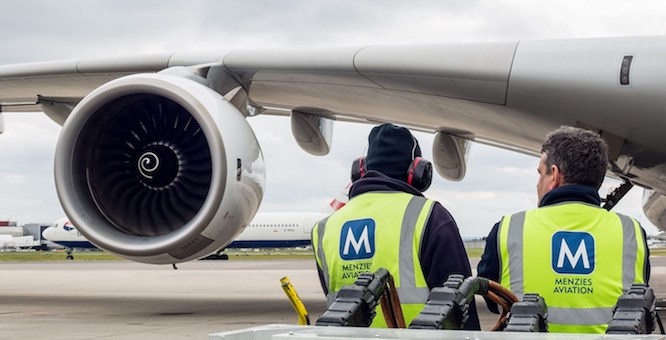Edinburgh-based airport services giant John Menzies plc is spearheading a campaign by the UK’s four biggest air services companies to secure a support package from Westminster to avoid the potential “failure of ground-handling companies.”
Bosses from Menzies, Swissport, Dnata and WFS (Worldwide Flight Services) have written to senior UK ministers including Treasury chief secretary Stephen Barclay asking for their employees’ wages to be part-subsidised until air passenger numbers return to pre-Covid levels.
The companies employ about 30,000 people in the UK and provide airport services including baggage handling, check-in, fuelling and catering.
“Failure to tackle the issue will lead to significant redundancies, a loss of vital skills, the likelihood of security and safety issues and ultimately could lead to the failure of ground-handling companies or the removal of services from non-financially viable airports,” the letter said.
Menzies shares have fallen about 70% in the past 12 months and the company’s biggest shareholders include the pension fund of publisher D.C. Thomson & Co.
Menzies’ corporate affairs director John Geddes said: “We are coming back out of the job retention scheme with a slither of the volume that we had going into it …
“We are going to lose a huge amount of these people if we have this cliff edge.”
Geddes added: “The job retention scheme has been very good, and we are very thankful to that.
“It has been very helpful to our operations.
“However, having a hard stop to that for the aviation industry is going to be very detrimental to jobs.”
The letter added: “Aviation faces a very different road to recovery to other parts of the economy.
“We believe that the time has come to consider a sector support package to recognise our unique circumstances.”
Menzies employed 32,000 globally before the Coronavirus pandemic, but has laid off about 21,000, many of whom are on furlough.
Menzies operates at more than 200 airports in more than 30 countries for about 500 airlines.
The letter proposes that the four companies continue to pay part of their employees’ wages, with the UK Government paying the rest until air travel recovers.
“This would help avoid, and is substantially less expensive, when compared to a situation where employees are made redundant en masse and the government has to pay 100% of the cost of unemployment benefit,” said the letter.
“The scheme would have an end date linked to the return of pre-Covid-19 flight volumes (e.g. 85% of 2019 volume) at which point the obligation would switch back to the employer to pay 100% of its staff costs.
“Employees would be brought back on a tapered basis over the next 18 months as flight volumes return. This gives the government a viable exit plan.”
